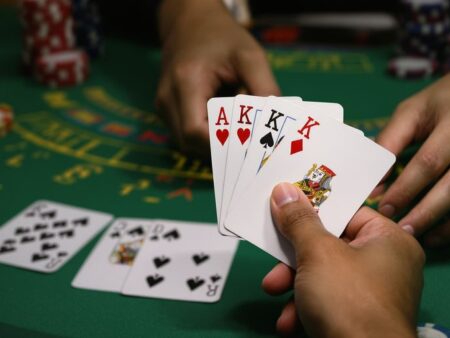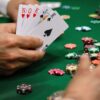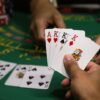Right, let’s have a yarn about how to keep your cool when you’re playing at online casinos. It’s easy to get swept up, especially when things aren’t going your way, or maybe even when they are! We’re going to look at why our moods go haywire and what we can actually do about it to keep things sensible. Knowing how to regulate emotions in online casinos is a big deal for having a good time without the drama.
Key Takeaways
- Spotting when you’re getting a bit antsy or irritable is the first step in managing your emotions while gambling online.
- Learning techniques like mindfulness and changing how you think about wins and losses can really help you stay in control.
- Setting firm limits on both your spending and the time you spend playing is a solid way to avoid getting too carried away.
- Talking to others in support groups or seeking professional advice can provide valuable strategies and encouragement.
- Developing healthy habits outside of gambling, like hobbies or relaxation techniques, gives you better ways to deal with stress and boredom.
Understanding Emotional Triggers in Online Casinos
When you’re playing at online casinos, it’s easy to get caught up in the excitement. But sometimes, that excitement can turn into something else, like frustration or a general feeling of being on edge. It’s important to know what’s setting you off.
Recognising Irritability and Restlessness
Ever find yourself getting snappy with people after a losing streak, or just feeling antsy and unable to sit still when you’re not playing? That’s a pretty common sign that your emotions are getting the better of you. It’s like your brain is wired for the next bet, and anything else feels like a drag. You might feel a constant urge to check your account or start a new game, even if you know you shouldn’t. This fidgety feeling, this impatience, it’s your body telling you something’s up.
Identifying Periods of Remission and Relapse
Sometimes, you might feel like you’ve got it all under control. You might take a break, feel pretty good, and think you’ve kicked the habit. But then, something triggers you – maybe a friend mentions a big win, or you see an ad – and suddenly you’re back at it, often with more intensity than before. These periods where you’re gambling less, or not at all, are called remission. But when you start again, that’s a relapse. Spotting these patterns is key to understanding your own behaviour and trying to prevent those relapses from happening.
The Impact of Financial Devastation
Let’s be honest, losing money is never fun, but when it starts to seriously impact your life, that’s a whole other ballgame. We’re talking about not being able to pay bills, dipping into savings meant for something important, or even borrowing money you can’t afford to repay. This kind of financial stress can be a massive trigger. It can make you feel desperate, leading you to chase losses with even bigger bets, hoping for that one big win to fix everything. Unfortunately, it usually just makes things worse, creating a nasty cycle of debt and despair.
Strategies for Emotional Self-Regulation
When you’re playing at online casinos, it’s easy to get caught up in the moment. Emotions can run high, and sometimes, you might not even realise it until you’ve gone a bit too far. That’s where learning to manage your own feelings comes in handy. It’s all about having a few tricks up your sleeve to keep yourself on an even keel.
Practising Mindfulness and Awareness
This is about paying attention to what’s happening right now, without judging it. Think of it like this: you’re playing a game, and you start to feel that familiar itch to chase a loss. Mindfulness means noticing that feeling – the tightness in your chest, the urge to click ‘spin’ again – without immediately acting on it. You just observe it, like watching a cloud drift by. It gives you a moment to pause and think, "Okay, I’m feeling this, but do I really want to do this?" It’s a simple idea, but it takes practice. You can start with just a few minutes each day, focusing on your breath or the sensations in your body. Over time, this awareness can really help you catch those impulsive urges before they take over.
Employing Cognitive Restructuring Techniques
This sounds a bit fancy, but it’s really just about challenging your own thoughts. You know, those little voices in your head that say things like, "Just one more spin and I’ll win it back" or "I deserve this win after all the losses." Cognitive restructuring is about spotting those unhelpful thoughts and swapping them out for more realistic ones. So, instead of "I’ll win it back," you might think, "Chasing losses usually makes things worse, and I’ve already set a limit." It’s like giving your brain a bit of a tune-up. It takes effort, and you might not get it right every time, but the more you practice challenging those negative or unrealistic beliefs about gambling, the stronger your ability to resist them becomes.
Utilising Relaxation Breathing and Muscle Relaxation
When you’re feeling stressed or keyed up from gambling, your body often shows it. You might feel tense, your heart might race, or your breathing could get shallow. Relaxation techniques are designed to calm your nervous system. Deep breathing exercises are a great start. Try breathing in slowly through your nose, holding it for a moment, and then exhaling slowly through your mouth. You can do this anywhere, anytime. Progressive muscle relaxation is another good one. It involves tensing and then releasing different muscle groups in your body. This helps you become more aware of where you hold tension and how to let it go. Doing these regularly can make a big difference in how you feel, both physically and mentally, when you’re tempted to gamble or after a session.
Setting Healthy Boundaries and Limits
When you’re playing at online casinos, it’s easy to get caught up in the excitement and forget about keeping things sensible. That’s where setting some firm boundaries comes in. Think of it like putting up guardrails on a winding road; they’re there to keep you safe and stop you from going off track. Without limits, you’re basically letting the casino call all the shots.
Implementing Strict Monetary Loss Limits
This is pretty straightforward. Before you even start playing, decide on a maximum amount of money you’re willing to lose in a single session or over a specific period, like a week. Once you hit that number, you stop. No ifs, buts, or ‘just one more spin’. It’s about respecting that pre-set limit, even if you’re on a losing streak or feel like you’re just about to hit a big win. Some people find it helpful to physically set aside the money they’re willing to gamble with, so it’s separate from their everyday funds. This makes it harder to dip into money meant for bills or savings.
Establishing Time Limits for Play
Just like with money, time can slip away really fast when you’re online gambling. It’s a good idea to set a timer before you begin. When that timer goes off, you log out, no matter what. This stops you from playing for hours on end without even realising it. You could also try scheduling your gambling sessions for specific, short periods, rather than playing whenever the mood strikes. This helps keep it as just one activity among many in your life, not the main event.
Maintaining a Balanced Approach to Gambling
Gambling should ideally be just one part of a full life, not the whole picture. This means making sure you’re still doing other things you enjoy, spending time with mates and family, and looking after your responsibilities. If you find that gambling is taking over, or that you’re always thinking about it, that’s a sign things are out of balance. Try to actively schedule other activities – maybe catch a movie, go for a walk, or pick up an old hobby. Keeping your life varied and interesting makes it less likely that gambling will become your only source of excitement or escape.
Seeking Professional and Peer Support

Sometimes, you just can’t go it alone when you’re trying to get a handle on things, especially with gambling. It’s a tough gig, and reaching out for a bit of help can make a world of difference. There are heaps of options out there, from formal support to just chatting with folks who get what you’re going through.
Engaging with Support Groups Like Gamblers Anonymous
Gamblers Anonymous (GA) is a well-known group where people share their experiences with gambling and how they’re working to stay on the straight and narrow. It’s a place where you can talk openly without judgment. The shared stories and the feeling of not being the only one struggling can be incredibly powerful. It’s not about telling you what to do, but more about offering support and a path forward that others have found useful.
Exploring 12-Step Program Benefits
Many support groups, including GA, follow a 12-step approach. These steps are basically a guide to help you work through issues related to addiction. They often involve things like admitting you have a problem, looking at your past actions, making amends, and helping others. It’s a structured way to approach recovery, and many people find it really helps them to change their thinking and behaviour patterns.
Utilising Self-Help Resources and Toolkits
Beyond group meetings, there are also heaps of self-help resources available. Think workbooks, online programs, and even apps. These can be great for when you need to work on things at your own pace. Some workbooks might guide you through understanding your triggers, setting goals, or learning new ways to cope with urges. They can be a good starting point or a handy supplement to other forms of support.
The Role of Medication in Mood Management
Sometimes, when you’re dealing with the ups and downs of life, especially when gambling is involved, your mood can really take a hit. It’s not uncommon for people struggling with gambling to also experience things like depression or anxiety. These feelings can make the urge to gamble even stronger, creating a bit of a vicious cycle. That’s where medication can come into play, not as a magic fix, but as a way to help manage those underlying mood issues.
Antidepressants and Mood Stabilisers for Co-occurring Disorders
If depression or anxiety is making things tougher, a doctor might suggest antidepressants or mood stabilisers. The idea here is that by getting those mood swings under control, you might find it easier to resist the temptation to gamble. It’s about tackling the emotional triggers that can lead you back to the online casino. Think of it like this: if you’re feeling really low or on edge, you’re more likely to seek that temporary escape that gambling can sometimes offer. By stabilising your mood, you’re removing one of the big reasons you might turn to gambling in the first place.
Narcotic Antagonists for Compulsive Urges
Then there are medications like naltrexone. You might have heard of it being used for other kinds of addiction, but it’s also showing some promise for gambling too. What it does is block the ‘reward’ part of your brain that gets a kick out of gambling. So, when you do gamble, it just doesn’t feel as good, which can really help in curbing those compulsive urges. It’s not about stopping you from playing, but about making the act itself less appealing, making it easier to say ‘no’.
Developing Healthy Coping Mechanisms

When you’re playing at online casinos, it’s easy to get caught up in the excitement, but sometimes things don’t go your way. That’s where developing some solid coping mechanisms comes in handy. It’s all about having a plan for when things get a bit tough, so you don’t end up feeling worse than you started.
Learning Adaptive Coping Skills
This is about picking up new, helpful ways to deal with stress, boredom, or whatever else is making you feel an urge to gamble. Think of it like learning a new skill for life. Instead of just reacting, you’re being proactive. Some good ones include:
- Problem Solving: This means looking at what’s causing you stress and trying to change the situation itself. If work is a pain, maybe you look at ways to make work better, rather than escaping to the casino.
- Cognitive Restructuring: This is a bit like being your own mental coach. You catch those unhelpful thoughts about gambling – like ‘I can win it all back’ – and swap them for more realistic ones, such as ‘Gambling is a risk, and I need to stick to my budget’.
- Seeking Social Support: Don’t bottle things up. Chatting with mates, family, or even a support group can make a huge difference. Just talking about it can lighten the load.
Avoiding Maladaptive Strategies
Just as important as learning what to do is knowing what not to do. Some ways of coping can actually make things worse in the long run. These are the ones to steer clear of:
- Avoidance: Pretending problems don’t exist or ignoring thoughts about gambling usually just makes the urges stronger later.
- Wishful Thinking: Daydreaming about winning big without a solid plan or effort isn’t a strategy; it’s just delaying reality.
- Social Withdrawal: Cutting yourself off from people, especially those who support your recovery, can leave you feeling isolated and more vulnerable to relapse.
- Self-Criticism: Beating yourself up after a loss or a slip-up doesn’t help. It just adds more negative feelings to the mix.
Finding Healthy Outlets for Stress and Boredom
When you’re not gambling, what else are you doing? It’s important to have other things that bring you enjoyment or help you relax. This fills the gaps that gambling might have occupied.
- Hobbies: Pick up that guitar again, try painting, gardening, or anything that gets you focused and feeling good.
- Exercise: A good walk, a run, or hitting the gym can be a fantastic stress reliever and mood booster.
- Mindfulness and Relaxation: Simple breathing exercises or meditation can help you stay present and calm, especially when urges strike. Even just five minutes of focused breathing can shift your state.
Having these healthy outlets means you’re not relying on the casino to feel a certain way. It’s about building a more balanced and fulfilling life outside of the games.
Self-Exclusion Programs as a Control Measure

Sometimes, you just need a hard stop. That’s where self-exclusion programs come in. Basically, you’re telling the casino, "Nope, not today, not for a while." You sign up, and they agree to keep you out of their physical venues or off their online sites for a set period. It’s a pretty direct way to put the brakes on things when you feel like you’re losing control.
Understanding Self-Exclusion Policies
These programs aren’t all the same, mind you. Different places have different rules. Some might ban you for six months, others for a year, two years, or even longer. In some spots, like parts of Canada, you could even cop a fine if you try to sneak back in. The idea is that by making it harder to get in, you’re less likely to gamble when the urge hits. It’s like putting a lock on the biscuit tin when you’re trying to cut down on sugar.
The Effectiveness of Self-Exclusion Programs
Now, about how well they work. Studies show they can be helpful, especially when you’re finding it really tough to manage your gambling on your own. People who use them often report fewer gambling problems and less severe consequences. However, it’s not a magic bullet. Some people do manage to get around them, or they might breach the agreement. Compliance rates can vary, and it seems like they work best when the gambling venues are really on board with enforcing the bans, and when it’s seen as a public health thing rather than just your problem. It’s often suggested that combining self-exclusion with other support, like counselling, gives you a better shot at success. Think of it as one tool in a bigger toolbox for getting things back on track.
The Importance of Delayed Gratification
It’s easy to get caught up in the excitement of online casinos, right? That rush when you hit a decent win, or even just the anticipation of what might happen next. But this immediate thrill can be a bit of a trap. We’re talking about delayed gratification here – basically, learning to hold off on wanting things right now. In the casino world, this means not needing that instant win or that quick payout to feel good.
Quelling the Need for Immediate Results
Think about it. Online casinos are designed to give you that hit of excitement fast. You spin the reels, you place a bet, and you get an outcome, good or bad, pretty much straight away. This constant stream of immediate feedback can make it really hard to wait for anything. It’s like your brain gets used to getting what it wants, when it wants it. Learning to be okay with waiting, to not need that instant win to feel satisfied, is a big step. It’s about finding satisfaction in the process, not just the outcome. This might mean setting yourself a goal, like playing for a certain amount of time without checking your balance, or deciding to walk away after a small win, rather than immediately trying to chase a bigger one.
Resisting Impulsive Gambling Decisions
Impulsive decisions are the enemy when you’re trying to manage your gambling. That urge to quickly put more money in after a loss, or to chase a win you just missed – that’s impulsivity at play. Delayed gratification helps you build a bit of a buffer between the urge and the action. It gives you a moment to pause and think. Instead of just reacting, you can actually consider the consequences. For example, if you feel the urge to deposit more money, you could try a simple technique: wait 15 minutes before you do anything. During that time, do something else entirely – grab a cuppa, stretch, or even just walk around the block. Often, that urge will pass, or at least lessen, giving you the space to make a more sensible choice. It’s about retraining your brain to not act on every single impulse that pops up.
Managing Emotions Through Cognitive Behavioural Therapy

When you’re feeling the urge to gamble, it’s easy to get caught up in a spiral of thoughts that just make things worse. That’s where Cognitive Behavioural Therapy, or CBT, comes in handy. It’s all about looking at those thoughts and beliefs you have about gambling and figuring out if they’re actually helping you or just leading you down a bad path.
Cognitive Restructuring for Gambling Thoughts
This is a big part of CBT. It means spotting those automatic thoughts that pop into your head when you’re thinking about or playing at an online casino. Things like "I’ll win back what I lost" or "Just one more spin and I’ll be okay." CBT helps you challenge these thoughts. Are they really true? What’s the evidence? You learn to swap out those unhelpful, often unrealistic thoughts for ones that are more balanced and based on reality. It’s like giving your brain a bit of a tune-up, so it’s not automatically jumping to conclusions that lead to more gambling.
Problem-Solving Skills Development
Sometimes, gambling can feel like an escape from problems in your life. CBT helps you develop better ways to deal with those real-world issues. Instead of reaching for the mouse and hitting ‘deposit’, you learn to break down problems into smaller, manageable steps. What’s the actual issue? What are some possible solutions? What’s the best way to tackle it? It’s about building confidence in your ability to handle life’s curveballs without resorting to gambling.
Mindfulness-Enhanced CBT Approaches
This mixes CBT with mindfulness, which is basically paying attention to the present moment without judging it. When you’re feeling an urge to gamble, mindfulness helps you notice that urge for what it is – just a feeling, a thought – without immediately acting on it. You can observe it, acknowledge it, and then let it pass, much like watching clouds drift by. This approach can be really effective because it gives you a bit of space between the urge and the action, making it easier to make a different choice.
Supporting Loved Ones with Gambling Addiction
It can be really tough when someone you care about is caught up in gambling addiction. You see them struggling, and it’s natural to feel a mix of frustration, helplessness, and even a bit of anger. But your support can actually make a big difference in their journey to get better.
Educating Yourself About Gambling Addiction
First off, it’s important to get a handle on what gambling addiction really is. It’s not just a lack of willpower or making bad choices. It’s a recognised mental health issue that messes with the brain’s reward system, making it super hard for someone to stop on their own. Understanding this helps you approach the situation with a bit more empathy, rather than just judging them.
Maintaining Open and Honest Communication
Talking about it is key, but you’ve got to do it right. Find a calm moment, and express your worries without pointing fingers or making them feel attacked. Using ‘I’ statements can help, like, ‘I’m worried about how the gambling is affecting our finances’ or ‘I’m concerned about your health.’ Remember, denial is pretty common, so they might downplay the problem or get defensive. Try not to argue or get aggressive; it usually just makes things worse. Just keep offering your support and gently nudge them towards getting professional help.
Encouraging Professional Help
Honestly, overcoming gambling addiction is a real challenge without professional support. Encourage your loved one to see a therapist, counsellor, or a program that specialises in this. You could even offer to help them find resources, book appointments, or go with them to sessions. Support groups like Gamblers Anonymous can also be a lifesaver, connecting them with others who get it. That sense of community and accountability is invaluable.
Setting Healthy Boundaries and Limits
This is a big one for your own well-being and to avoid accidentally enabling the addiction. While you want to help, handing over cash to cover debts or bailing them out financially just keeps the cycle going. Be clear that you won’t be providing money for gambling losses anymore. You might also need to set limits on how much you’ll discuss the issue or how you’ll manage shared finances. Taking charge of the household budget, for instance, can ensure bills are paid and savings are safe. These boundaries protect you and also show your loved one that their actions have consequences.
Taking Care of Yourself
Supporting someone with a gambling addiction can really wear you down. It’s vital to look after yourself too. Consider joining a support group like Gam-Anon, which is specifically for families of people with gambling problems. It’s a safe space to share your experiences, connect with others, and get advice on how to cope with the stress. Don’t hesitate to seek professional help for yourself if the situation is taking a toll on your health. Remember, you can offer support, but you can’t control or ‘fix’ their addiction. Looking after your own mental and emotional health means you can be a strong support without getting completely overwhelmed.
Wrapping Up: Keeping Your Cool at the Casino
So, we’ve gone through a fair bit, haven’t we? From spotting those tricky emotional triggers to actually doing something about them, like setting limits or even trying out mindfulness, there’s a lot to take on board. It’s not always easy, and sometimes you might slip up, which is totally normal. The main thing is to keep trying different strategies. Maybe it’s talking to mates in a support group, or just remembering to take a breather when things get a bit much. It’s all about finding what works for you to keep things balanced and enjoyable, rather than letting it get on top of you. Remember, it’s a game, and staying in control of how you feel is half the battle.
Frequently Asked Questions
What are some signs that gambling is becoming a problem?
When you can’t gamble, you might feel really annoyed or unable to sit still. It’s like your body is telling you it wants to play. Sometimes, you might stop gambling for a bit, but then the urge comes back even stronger. It’s important to notice if these feelings are getting out of hand.
How can losing money gambling affect my life?
Losing money can be a big worry. If you’ve lost a lot of cash, it can mess with your life in many ways, not just your wallet. It can affect your relationships, your job, and how you feel about yourself.
How can I calm down when I feel the urge to gamble?
Trying to stay calm when you feel like gambling is key. You can do this by focusing on your breathing, like taking slow, deep breaths, or by tensing and then relaxing your muscles. This helps your body chill out.
Why is it important to set limits when gambling online?
It’s a good idea to set limits on how much money you’re willing to lose and how long you’ll play. Think of it like having a budget for your fun. Sticking to these limits helps you keep gambling from taking over.
Where can I find support if I’m struggling with gambling?
There are groups like Gamblers Anonymous where people share their stories and help each other. These groups are like a support network. They can also help you find tools and tips to manage your urges.
Can medicine help with gambling problems?
Sometimes, doctors might suggest medicines to help with other issues like feeling sad or anxious, which can make gambling problems worse. There are also medicines that can make the urge to gamble less strong.
What are some healthy ways to deal with stress instead of gambling?
Instead of gambling when you’re bored or stressed, try finding other things to do. This could be a hobby, exercising, or just talking to a friend. Learning new ways to handle tough feelings is super helpful.
What is ‘self-exclusion’ and how does it work?
You can ask the online casino to block you from playing for a certain amount of time, or even permanently. It’s a way to take control if you find it hard to stop yourself.







